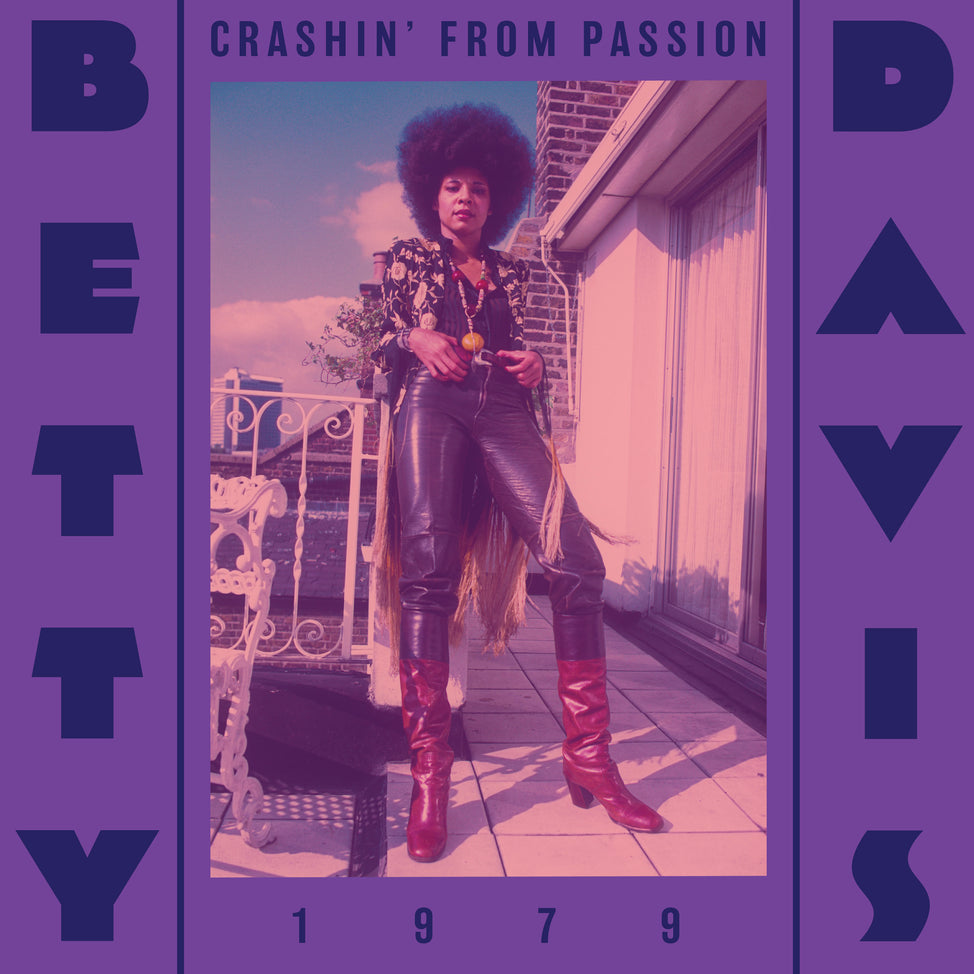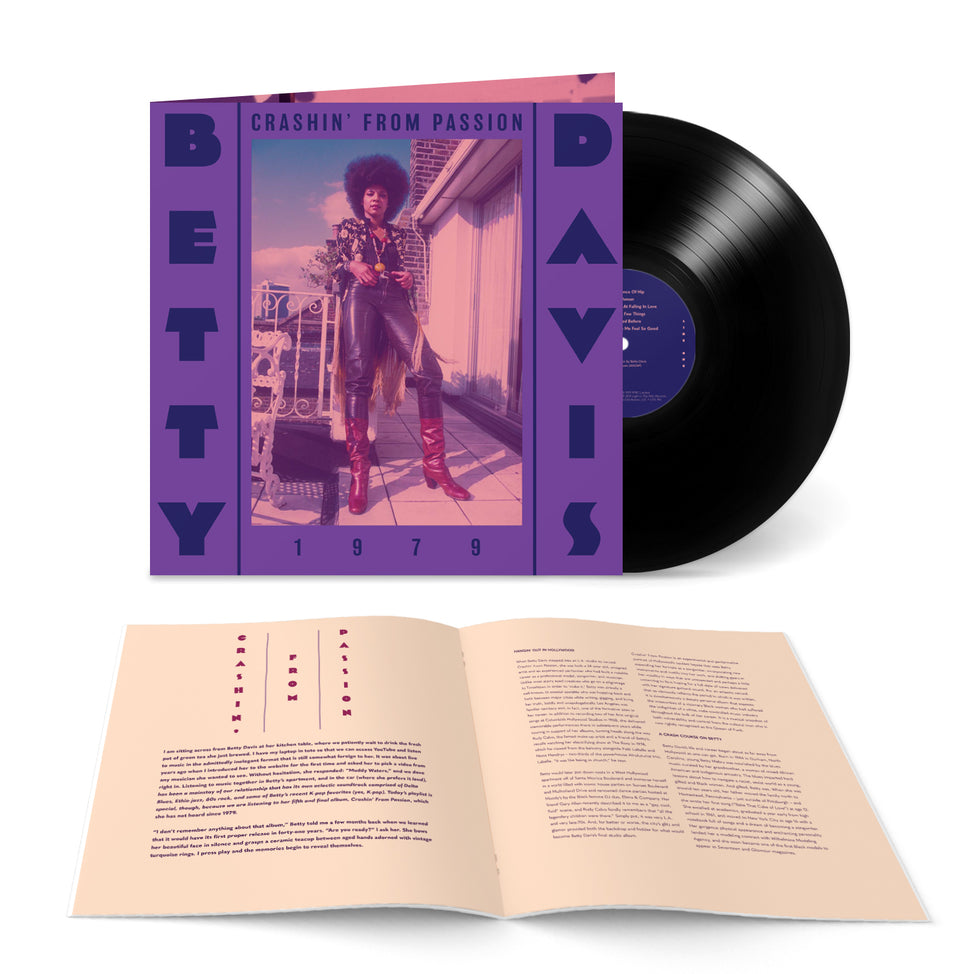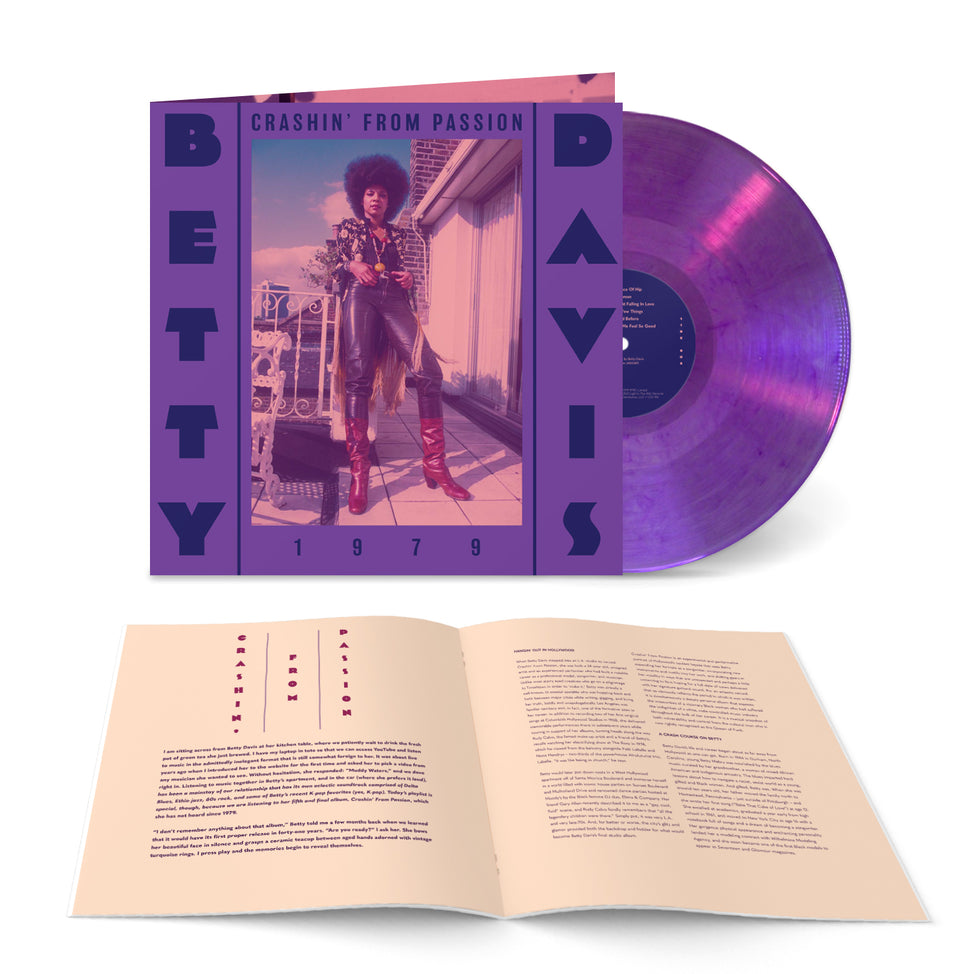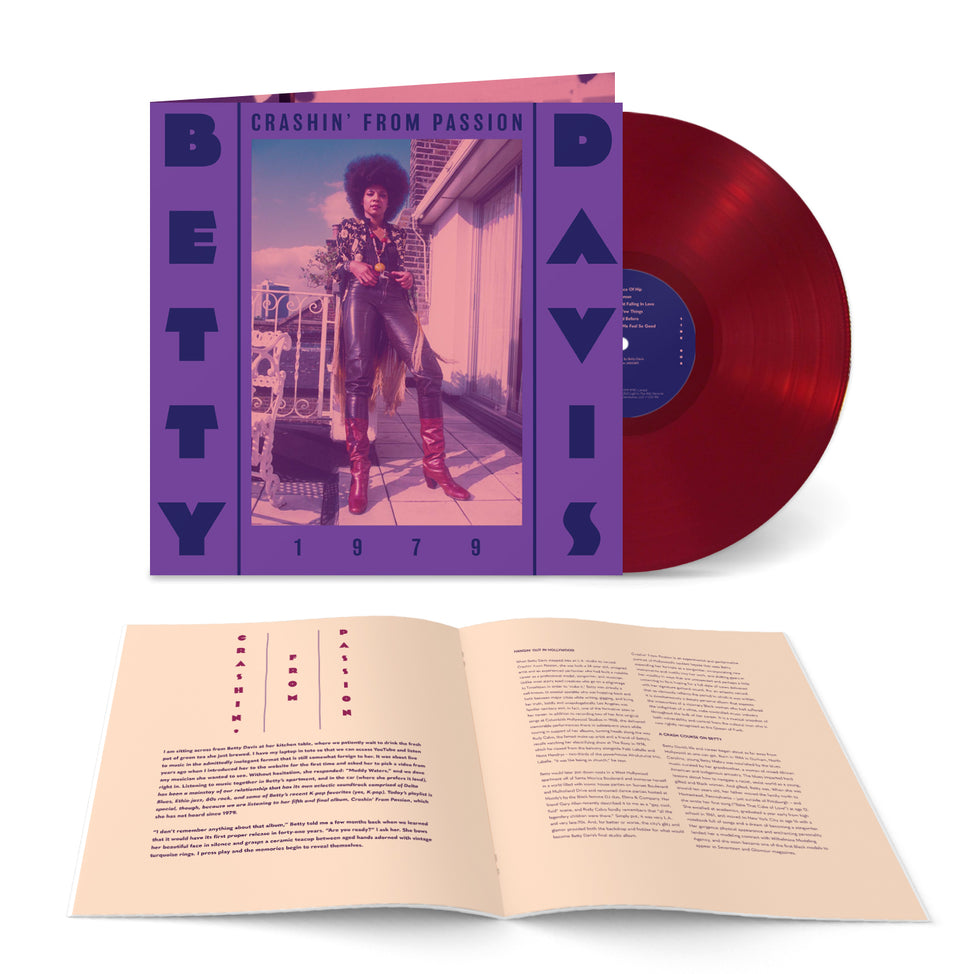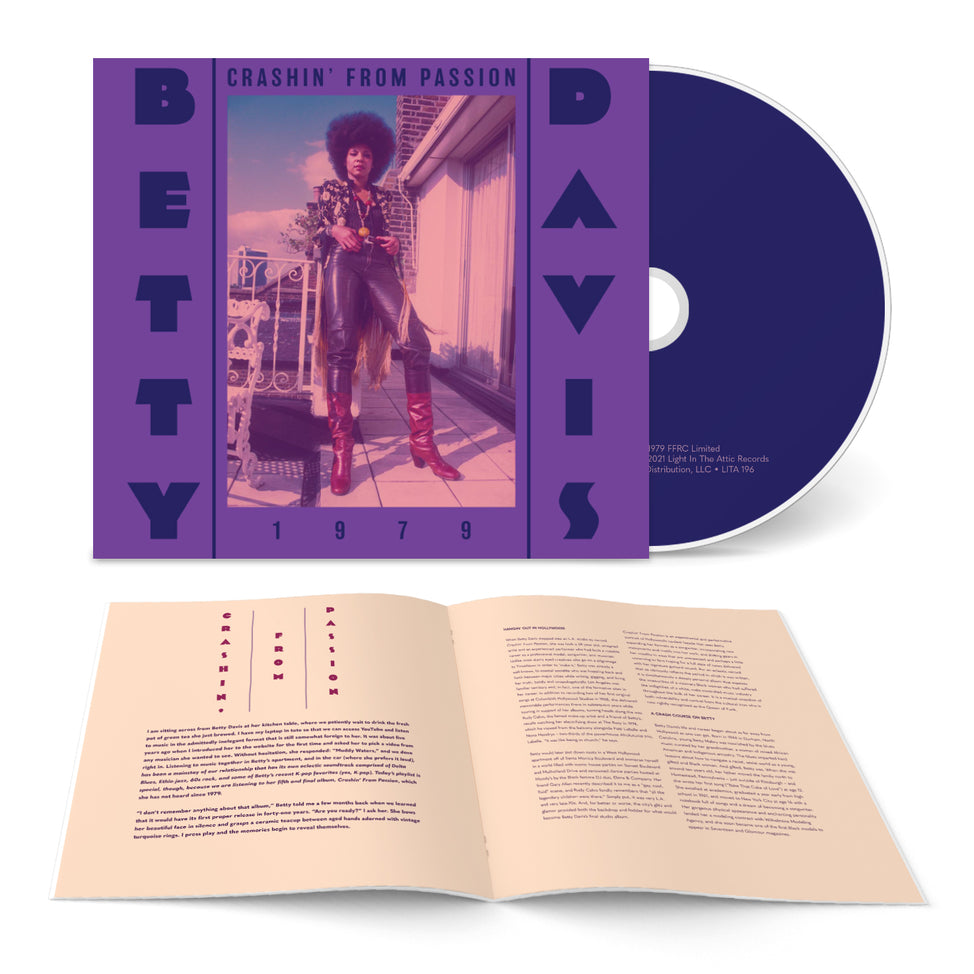Home Artist: Betty Davis Crashin' From Passion
Betty Davis
Crashin' From Passion
LITA 196
- First time on vinyl
- Newly remastered
- Featuring Herbie Hancock, Martha Reeves, Alphonse Mouzon, Chuck Rainey, Patryce “Choc’let” Banks, Carlos Morales, and members of The Pointer Sisters
- LP & CD Booklet features new liner notes by Danielle Maggio interviewing Betty, plus unseen photos and lyrics
- Vinyl pressed at RTI
- LP housed in a gatefold jacket
Special Vinyl Color Editions are available including: - Clear Purple Crush Wax Edition
- Transparent Red Wax Edition (RETAIL ONLY)
- Transparent Blue Wax Edition (U.K. RETAIL ONLY)
Description
In the 1970s, Betty Davis defied genre and gender by pushing her voice to extremes and embracing the erotic. She articulated a kind of pre-punk, funk-blues fusion that had yet to be normalized in mainstream music – a style that few musicians have come close to replicating. As one of the first Black women to write, arrange, and produce her own albums, Betty was a visionary who disregarded industry boundaries and constraints. Raw, unapologetic and in full control, Betty paved the way for generations of future artists who said “funk you” to the music industry and social norms.
In 1979, when Davis entered an L.A. studio to record her fifth and final album, she was reeling from a series of setbacks. Three years earlier, after recording her fourth album, Is It Love Or Desire, Davis was dropped from her label and the LP was subsequently shelved. In 1978, her beloved band Funk House went their separate ways. Looking for a fresh start, Davis relocated to Hollywood to focus on songwriting. Before long, British manager Simon Lait (Toni Basil), offered to fund her next project.
With renewed vigor, Davis reunited with former Funk House guitarist Carlos Morales and brought together industry veterans like fusion drummer Alphonse Mouzon and session bassist Chuck Rainey. Old friends Anita and Bonnie Pointer (The Pointer Sisters) and Patryce “Choc’let” Banks joined Davis on vocals, as did Motown legend Martha Reeves. The resulting album, Crashin’ From Passion, was her most musically diverse, blending elements of reggae and calypso (“I’ve Danced Before”), jazz (“Hangin’ Out in Hollywood,” “Tell Me a Few Things”), dark synth-pop (“She’s a Woman”), and even disco (“All I Do Is Think of You”). Equally exploratory are Davis’ vocals, as she trades in her signature sass and snarls for more nuanced stylings.
Among the album’s few funk tracks is “Quintessence of Hip,” in which Davis hails musicians like Bob Dylan, Billie Holiday, Stevie Wonder, and John Coltrane, while deftly integrating elements of their work. The song also offers a moment of stark vulnerability, as she sings, “Isn’t rich? Isn’t it queer? Losing my timing so late in my career.” It would prove to be a prophetic line in the months to follow.
The mixing process was mired by artistic differences and then cut short, amid the death of Davis’ beloved father. Bereft and exasperated, Davis returned home for the funeral, setting into motion her retirement from the music industry. Crashin’ From Passion, meanwhile, would be shelved for 15 years and licensed for a CD-only release, without Davis’ consent, in the ‘90s. This 2023 edition of the album, made with Davis’ full approval and cooperation, marks its first official release and first time ever on vinyl. The package was designed by GRAMMY®-winning artist, Masaki Koike, while the album cover features an incredible shot of Betty captured in London in the mid-1970s by renowned photographer Kate Simon.
Crashin’ From Passion was remastered by Grammy nominated engineer Dave Cooley at Elysian Masters and pressed on vinyl at Record Technology, Inc. (RTI). The accompanying booklet includes a treasure trove of rare photos from the era, plus lyrics, and new liner notes by writer, ethnomusicologist, and Betty’s close friend, Danielle Maggio, who integrates interviews that she conducted with Davis, marking her last ever interviews.
Artist Bio
There is one testimonial about Betty Davis that is universal: She was an artist ahead of her time. From her brief moment in the limelight to her decades of living as a recluse until her death in 2022, Betty Davis was a beautiful enigma. A drop-dead gorgeous model (and one of the first Black models to be featured in Glamour and Seventeen), Betty ran in crowds with Jimi Hendrix and was briefly married to Miles Davis (not to mention she played a large part in his stylistic radicalization). Her demure demeanor in life starkly contrasted with her onstage persona which oozed raw feminist liberation, a truly original punk-funk provocateur in her silver go-go boots and signature afro.
One can hardly imagine the genre-busting, culture-crossing, musical magic of Janelle Monáe, OutKast, Prince, Erykah Badu, Rick James, The Roots, or Madonna without the influence of R&B pioneer Betty Davis. Rappers from Ice Cube to Talib Kweli to Ludacris have rhymed over her intensely strong but sensual music. Yet somehow, Ms. Davis’s unique story, still widely unknown, is unlike any other in popular music.

PHOTO ON LEFT: Betty Davis, Circa 1973, Photo by Mel Dixon
Betty wrote the song “Uptown” for the Chambers Brothers before marrying Miles Davis in the late 60s, influencing him with psychedelic rock and introducing him to Jimi Hendrix—personally inspiring the classic album Bitches Brew. But her songwriting ability was way ahead of its time, as well. Betty not only wrote every song she ever recorded and produced every album after her first but also penned the tunes that got The Commodores signed to Motown. The Detroit label soon came calling, pitching a Motown songwriting deal which Betty turned down. Motown wanted to own everything, but that didn't fly with Betty and her DIY ethos. Marc Bolan of T. Rex urged the creative dynamo to start writing for herself. She would eventually say no to Eric Clapton as her album producer, seeing him as too banal.
In 1973, Davis would finally kick off her cosmic career with an amazingly progressive hard funk, sweet soul, self-titled debut. Betty Davis showcased her fiercely unique talent with such gems as “If I’m In Luck I Might Get Picked Up” and “Game Is My Middle Name.” The album was recorded with Sly & The Family Stone’s rhythm section, sharply produced by Sly Stone drummer Greg Errico, and featured backing vocals from Sylvester and The Pointer Sisters.
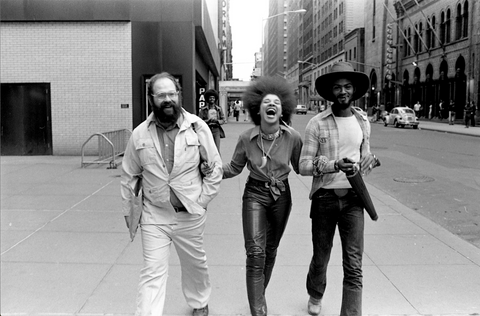
Her 1974 sophomore album They Say I’m Different features a worthy-of-framing futuristic cover challenging David Bowie’s science fiction funk with real rocking soul-fire, kicked off with the savagely sexual “Shoo-B-Doop and Cop Him” (later sampled by Ice Cube). Her follow-up is full of classic cuts like “Don’t Call Her No Tramp” and the hilarious, hard, deep funk of “He Was A Big Freak.” Betty Davis was riding high in the 70s. A new record label, a series of high-profile relationships, and intensely sexualized live performances made her a rising star. It seemed like everything was aligned to take the music world by storm. So Betty and band got back into the studio where she would act as writer, producer, and performer, creating her definitive release–Nasty Gal.
Her entire catalog has now been lovingly remastered from the original tapes by Light in the Attic to sound as ferocious and revolutionary as they did when they first sprung on an unsuspecting world in the early 70s.
PHOTO ABOVE: L to R - Norman Schreiber, Betty Davis, Chuck Mabry, Photo by Robert Brenner




